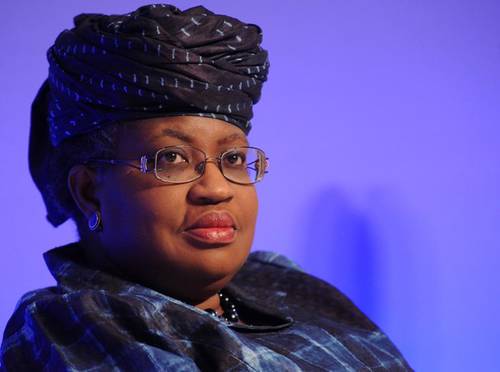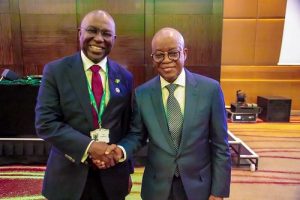Becareful Entering Into Bilateral Trade, Okonjo-Iweala Cautions Nigeria, Others

Nigeria and other African countries have been advised to be careful when entering into bilateral trade with advanced countries in order not to regret in future.
The Director-General of the World Trade Organisation (WTO), Dr. Ngozi Okonjo-Iweala, who gave this advice said instead Nigeria and other countries could do this through the WTO to avoid being put into disadvantaged position in world trade.
Speaking during Forbes Leading Women Summit 2021 edition tagged “One-on-One with Ngozi Okonjo-Iweala,” held virtually Tuesday, Okonjo-Iweala said the WTO would provide a forum for multilateral trade.
According to her, “ So, what else has Nigeria got to do, and African countries have to do so that we do not enter into a lot of bilateral trade relationships with rich countries where we will be at a disadvantage? We must bring them to the multilateral negotiation table at the WTO, Nigeria included.”
The WTO DG however called on Nigeria and other African countries to look inward and increase their level of production and sell to be able to improve in their share of global trade.
She promised that the WTO will develop its rules as a way of strengthening the Micro, Small and Medium Enterprises (MSMEs) and integrating them into regional and global value chains.
According to her, “If you want to trade more and be part of the global system, you need to step back and look internally at what you can produce. To trade more, you have to produce more. For Nigeria, I think we need to look at the diversification of our products. As you can see, many countries are moving away from fossil fuels because they have high carbon emissions and turning to renewable. So, we have to think ahead in Nigeria about what does this means?”
“First, let me look at it from the perspective of trying to bring in marginalised population. There is a lot we are doing to look at the MSMEs and the rules of trade that could help bring those enterprises into regional and global value chains where they can participate in global trade. So, we are looking at how we can make rules that are supportive of MSMEs for trade. And how we can also work with governments and other organisations to get investments into the MSMEs companies because most of them felt the liquidity crunch that is always a problem to women in trade.”
The Director-General of the World Trade Organisation (WTO), Dr. Ngozi Okonjo-Iweala, who gave this advice said instead Nigeria and other countries could do this through the WTO to avoid being put into disadvantaged position in world trade.
Speaking during Forbes Leading Women Summit 2021 edition tagged “One-on-One with Ngozi Okonjo-Iweala,” held virtually Tuesday, Okonjo-Iweala said the WTO would provide a forum for multilateral trade.
According to her, “ So, what else has Nigeria got to do, and African countries have to do so that we do not enter into a lot of bilateral trade relationships with rich countries where we will be at a disadvantage? We must bring them to the multilateral negotiation table at the WTO, Nigeria included.”
The WTO DG however called on Nigeria and other African countries to look inward and increase their level of production and sell to be able to improve in their share of global trade.
She promised that the WTO will develop its rules as a way of strengthening the Micro, Small and Medium Enterprises (MSMEs) and integrating them into regional and global value chains.
According to her, “If you want to trade more and be part of the global system, you need to step back and look internally at what you can produce. To trade more, you have to produce more. For Nigeria, I think we need to look at the diversification of our products. As you can see, many countries are moving away from fossil fuels because they have high carbon emissions and turning to renewable. So, we have to think ahead in Nigeria about what does this means?”
“First, let me look at it from the perspective of trying to bring in marginalised population. There is a lot we are doing to look at the MSMEs and the rules of trade that could help bring those enterprises into regional and global value chains where they can participate in global trade. So, we are looking at how we can make rules that are supportive of MSMEs for trade. And how we can also work with governments and other organisations to get investments into the MSMEs companies because most of them felt the liquidity crunch that is always a problem to women in trade.”





